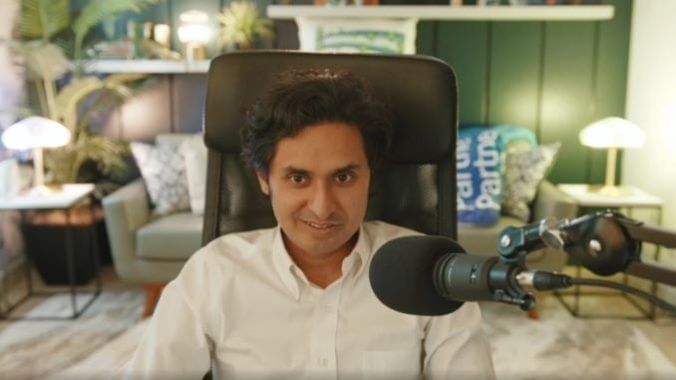Before sitting down to write this article, I watched a 10-minute video titled “Thought Control.” In it, a man guides me through a meditation in which I aim to notice my thoughts for a minute, then observe objects in my surroundings for another minute. After explaining the exercise and noting how long each meditation should be practiced, the video ends.
This isn’t a YouTube video, however. This is a video from “Dr. K’s Guide to ADHD & Doing Stuff,” the recently released module of the overall guide, “Dr. K’s Guide to Mental Health.” Unlike a lineral series of videos, this guide is set up like a skill tree, specifically modeled after the skill tree in Final Fantasy X. Each module (ADHD & Doing Stuff, Depression, Anxiety and Meditation) contains 26 to 49 videos, although some of the videos for each module are the same, with various branches depending on the topic. For example, there are clinical and non-clinical tracks for depression, anxiety and ADHD, with the clinical track focusing on medication, meditations and therapies, while the latter focuses on self-help techniques such as dealing with specific problems relating to focus, anxiety or depression.
This guide is a part of the “Healthy Gamer” brand, an organization likely best known for its Twitch and YouTube channels, “HealthyGamerGG,” the former of which has over 600,000 subscribers, and the latter having just over one million subscribers. The channel is run by Dr. Alok Kanojia, commonly referred to as “Dr. K,” a registered psychiatrist who used to teach at Harvard Medical School before deciding to stream on Twitch, where he talks about various aspects of mental health and “interviews” (essentially does a live therapy session with) streamers and viewers.
Dr. K has a seemingly effortless charisma, as he is able to be passionate and confrontational while also simultaneously displaying high levels of empathy and care in the subjects he talks about. A lot of the appeal of Dr. K likely comes from his background as well. Before getting into Harvard, he had dropped out of college due to poor grades and struggled with videogame addiction. His parents then sent him to India to train with monks, where he developed his spirituality and learned about meditation.
Armed with a new sense of purpose, he started applying to get into medical schools despite his terrible GPA, and due to a set of fortunate circumstances, found himself studying at Harvard. He then went on to become an instructor at the institution and became what he describes as a “somewhat famous” psychiatrist that people like CEOs and investment bankers would seek out. Having grown tired of this field, however, he started Healthy Gamer as an educational resource aimed at younger, more “online” people who he felt were experiencing under-researched and increasingly worrying mental health problems due to technology and videogame use and addiction.
One look at the Healthy Gamer’s subreddit, where Dr. K will draw from for many of his discussions, confirms these problems. There are the occasional posts where users celebrate their successes, but many of the posts display low self esteem, depression and occassionally suicidal ideation. There is also a troubling amount of incel-adjacent or straight-up misogynistic posts, perhaps something to be expected by a community marketed toward mentally ill gamers, but still concerning nonetheless. Dr. K has attempted to address this issue more than once, but it appears to still be a problem in some circles. Anecdotally, many of the same people who follow Healthy Gamer seem to also follow Jordan Peterson, a clinical psychologist who speaks online about similar issues concerning wellbeing and mental health but who also has consistently made transphobic and misogynistic statements. To his credit, I have never seen or heard of Dr. K making or excusing these types of comments himself, and he has made videos in support of the LGBTQ+ community and women’s rights.
There was also a controversy over two years ago where one person who Dr. K interviewed, Byron Bernstein (commonly going by the username “Reckful”), died by suicide in 2020. A documentary on YouTube by the now-deleted account “mrgirl” took clips of Dr. K’s various interviews with Reckful and others that he considered to be problematic, while interviewing multiple therapists and a psychiatrist who commented on the irresponsible nature of conducting what are essentially live therapy sessions to a public audience. Dr. K responded to the video and ethical concerns from others in his own video, where he defended his stance that the interviews were technically not therapy and that Reckful was a friend, not a patient.
I don’t think I know enough to have a stance on whether or not anything Dr. K has done has been actively harmful, but personally, I have relied on his streams, interviews and guides to get me through some dark times. I’m fortunate to have access to a good therapist and psychiatrist, but unless it’s an emergency, those meetings are scheduled, and sometimes you need a voice to tell you that what you’re feeling is normal and to give you some advice for how to deal with it in the present moment.
A common refrain of the community is that Dr. K’s streams have AOE (area of effect) healing, which means that by hearing him talk to one person about their problems, the thousands of people who watch his content are hopefully able to relate and take some lessons away from it as well. I’ve certainly benefited from Healthy Gamer’s content, and the guides in particular have been a great resource for when I need help navigating my feelings. At a time when “gamer” often feels synonymous with “toxic,” an online space teaching these people how to deal with their emotions in healthy, healing ways seems like a good thing to me.
Joseph Stanichar is a freelance writer who specializes in videogames and pop culture. He’s written for publications such as Game Informer, Twinfinite and Looper. He’s on Twitter @JosephStanichar.
